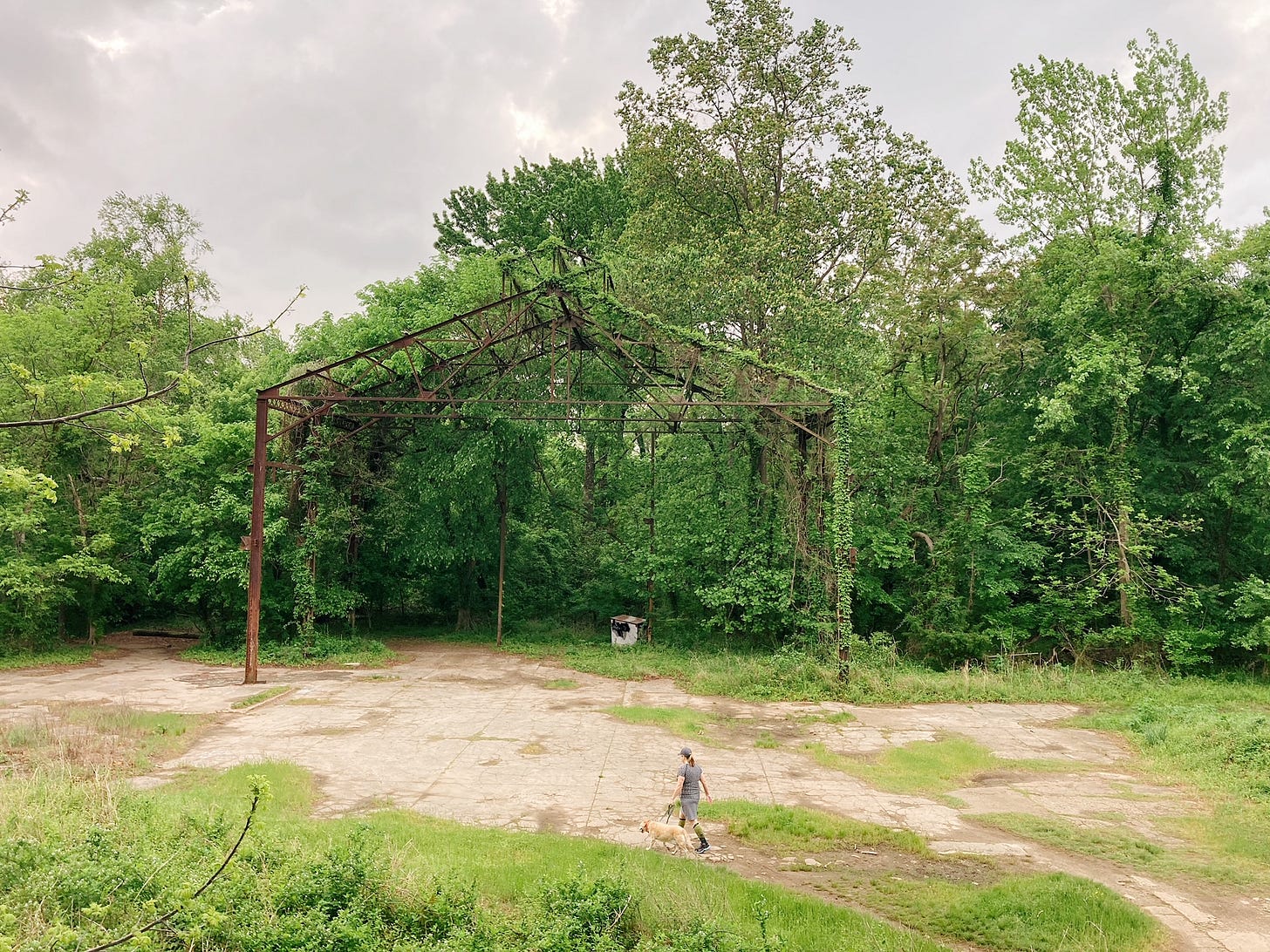LIVING
Spring is a short season in Raleigh. By the time mid-May hits, we’ve already had multiple 80+ degree days and the sun is up by 6am, and by the end of the month, the school I live next to has completed their year and traffic in my neighborhood is significantly reduced. I love this in-between season, when it’s not yet too hot, humid, or buggy to spend time outdoors but time feels slower, more relaxed.
I spent the first couple days of the month in DC, and it felt like true summer there already — pre-COVID summer, even. The trains were packed, the streets were full, and all the tables at Wunder Garten were taken by 6pm. This is the first summer in eight years that I’m not spending the month of July in the city, so I savored this mini trip, and look forward to what the rest of the season brings at home.
READING
A good reading month: six fiction, four nonfiction, and three design books.
I started the month with The Medium is the Massage by Marshall McLuhan, a condensed, visual presentation of McLuhan's ideas about the nature of media and how it affects social and cultural change. The book was published in 1967 but most of it still holds up. A few of its ideas:
"Any understanding of social and cultural change is impossible without a knowledge of the way media work as environments." (p26)
"By altering the environment, media evoke in us unique ratios of sense perceptions. The extension of any one sense alters the way we think and act - the way we perceive the world." (p41)
"Environments are not passive wrappings, but are, rather, active processes which are invisible." (p68)
I belatedly finished my reread of Dante’s Inferno, which I read along with the Ascend - Great Books podcast for Lent. Each time I read it, Dante's words and meaning become clearer. I gleaned new insights from the podcast about the historical views of pagan gods, why some sins are ranked differently than how we moderns would expect, and how Dante’s medieval setting influenced his writing.
Continuing on with my quest to read all of Thomas Hardy’s books, this month I read A Pair of Blue Eyes. The novel focuses on Elfride, the strong-willed but passive daughter of a seaside country parson, who finds herself caught between two men. One suitor, Stephen, is an aspiring architect and the son of a poor couple in Elfride’s village, and the other, Harry, is a relation of Elfride’s stepmother and stuck in Victorian ideals of female purity. It's a Hardy novel, so the tragic ending was not a surprise.
This month’s sci fi book club pick was Icehenge by Kim Stanley Robinson. The novel is split into three parts, each jumping ahead about 100 years: in the first, a woman named Emma decides not to join a rebel group who want to explore past the solar system and returns home to Mars; in the second, an archeologist wants to find out what really happened during a rebellion on Mars, as news of a Stonehenge-like structure (dubbed Icehenge) is found on Pluto and assumed to be the work of the explorers as they passed out of the solar system; and in the third, the archeologist’s grandson puts forth his own rival theory about how Icehenge came to be, as he thinks Emma created a new identity and built it herself, rather than the explorers. The book also considers what it means to have artificially extended life — people forget their own memories and stagnate, there is no impetus to push on and do more because they have so much time.
I finally completed two series I started. I finished Ursula K. Le Guin’s Hainish Cycle series with The Word for World is Forest. A world of peaceful, human-related beings is taken over by humans, who harvest the forests to send wood back to earth, and its population is forced into slavery and treated with violence. One of the beings leads his people to retaliate against the humans and succeeds in getting them to leave — but now violence is present in their world, and they cannot go back to their old, peaceful ways. Le Guin is so good at weaving a philosophical question into fiction; she does not craft genre fiction for the aesthetics but to give shape to something deeper. I wanted to read it slowly to soak in all the themes but I was tripping over the pages trying to read it faster. I also finished Sigrid Undset’s Kristin Lavransdatter trilogy with The Cross. I forgot to read this one earlier, honestly — I read the second one in February and never got the third one from the library. The final entry follows the end of Kristin's life as she raises her children, lives apart from her husband, and reflects on her life and her choices. A sobering read, to see how choices made from youthful passion can reap consequences well into old age.
Francis Shaeffer’s True Spirituality felt like revisiting the basics. Schaeffer explores the Christian faith according to what the Bible actually says it is. It's often repetitive, probably because the book was based on some lectures he gave. Some parts were insightful, others I skimmed.
I read a couple books that have been sitting on my shelf for a while and was disappointed by both of them. The Age of Goodbyes by Li Zi Shu is a translated work set in Malaysia that follows three storylines, sort of — it's a work of metafiction, but not one that benefits from the structure. I only cared about the main storyline, about a woman who manages a restaurant and marries a gangster. The other two stories, about "you" reading The Age of Goodbyes and a literary critic who writes about the author of The Age of Goodbyes, add nothing to the narrative, cut in at inconvenient times, and never connect at the end. I also read Epicurean Simplicity by Stephanie Mills, which I thought was going to be a slow living memoir but was more a screed against anyone who doesn’t live the way the author lives. Any reflection on the goodness and pleasure of nature and simple living was marred by the scolding, condescending tone.
I was also disappointed by a newer book purchase. I bought Offline Matters by Jess Henderson thinking it would be similar to David Sax's analog-focused books, but instead it's a manifesto against digital-first creative ideas and the primacy of exposure and money over the concerns of customers. But it doesn't bring anything new to the conversation, nor does it share many concrete ideas for others to take and use.
I flipped through some design books I picked up the library: Library Design, Uncommon Kitchens, and Simplicity at Home. I’ve been inspired by design-focused substacks to seek out creativity in the home, and picked these up while browsing my library’s nonfiction section. I enjoy seeing how people transform their spaces into truly beautiful and still functional places.
WATCHING
I have said before that I do not think highly of Marvel, but I do love Sebastian Stan and Florence Pugh (and was influenced by this A24-style trailer highlighting the creative team), so I begrudgingly took myself to see Thunderbolts* (Jake Schreier, USA/Australia/Canada, 2025). And honestly, it’s the best thing Marvel has made in a long time. But at the same time, it reminded me of the Barbie movie, in that both cover a topic (depression in Thunderbolts*, feminism in Barbie) that seems to come 10 years too late and has already been better done in other movies. Regardless, I was entertained for two hours (and bless them for not dragging the runtime out another half hour).
I had a Cary Grant double header and watched Bringing Up Baby and Suspicion. Bringing Up Baby (Howard Hawks, USA, 1938), the classic screwball comedy with Grant playing a professor trying to secure a donation to his museum and Katherine Hepburn playing a flighty heiress with a pet leopard. I still don’t enjoy screwball comedies — the inherent miscommunication is so irritating to me — but this one is fun. Suspicion (Alfred Hitchcock, USA, 1941), in a 180 twist, has Grant as a man who turns out to be a gambler, a con man, and maybe even a murderer. He’s unnervingly menacing in this role and Joan Fontaine deserved her Oscar for playing Grant’s naive love interest. I don’t like how the studio changed the movie’s ending — let him be a villain! — but if you ignore the last few minutes, it’s a great movie.
I missed The Conversation (Francis Ford Coppola, USA, 1974) when the Alamo played it earlier this year but caught it on streaming this month. Gene Hackman plays a paranoid surveillance expert who has second thoughts about his most recent assignment after growing suspicious of his client’s motives. I really loved the analogue surveillance equipment; the opening scene of his team recording the conversation and the scene where he’s splicing together the three recordings to make a complete, gap-free tape were deeply satisfying to watch. I also found this article about the movie’s release around the same time as the Watergate scandal an interesting accompaniment.
I watched L’Avventura (Michelangelo Antonioni, Italy/France, 1960) after someone on Substack mentioned it, but I can’t say I enjoyed it. A woman goes missing during a boating trip, and I assumed the rest of the movie would be spent looking for her. But instead, her fiancé and best friend fall in love with each other, then the fiancé cheats on the best friend with another woman. Everyone is unhappy and angsty and the movie ends inconclusively. Is this just about rich, young people moving through life without purpose or consequences?
One Friday night I decided to rewatch Scott Pilgrim vs the World (Edgar Wright, UK/Canada/Japan/USA, 2010), about a dorky young man who must defeat his new girlfriend’s seven evil exes. Some of the jokes have aged poorly, but the comic book-style violence and the kooky premise are still wildly entertaining.
In anticipation of Wes Anderson’s new release, I rewatched a few of his older films:
The Darjeeling Limited (2007), about three brothers who reunite on a train trip across India a year after their father’s death.
Fantastic Mr. Fox (2009), a stop motion movie about a fox who tries pulling off one final farm raid after becoming a father, but instead incurs the farmers’ wrath on the whole animal community.
Moonrise Kingdom (2012), about two 12-year-olds who fall in love and run away into the wilderness on a New England island. This was the first Anderson film I ever saw and it has always been my favorite.
I was able to score an early ticket to The Phoenician Scheme (Wes Anderson, USA/Germany, 2025) at the Alamo a week before its official release, which included a live-streamed Q&A with Wes and the three lead actors at the end. A wealthy businessman appoints his only daughter, a nun, to be the sole heir of his estate and brings her along on his new scheme. At first it didn’t feel like an Anderson film — the line delivery from the daughter wasn’t stilted enough — but I soon settled in and found it the best film he’s made in years. It’s crammed (too) full of characters and often glides too quickly along the surface of the scenes. But it’s a fun, silly, moving, adventure film (and Michael Cera should always be in his films, he’s perfect).







So fun you got to see the new film!! Our boys (5, 4, 2) watched Fantastic Mr. Fox several times this past winter and they still love talking about it. Even printed off some related coloring pages a few times. haha I think Moonrise Kingdom might also have been my first Wes Anderson film. It's a specially nostalgic one.